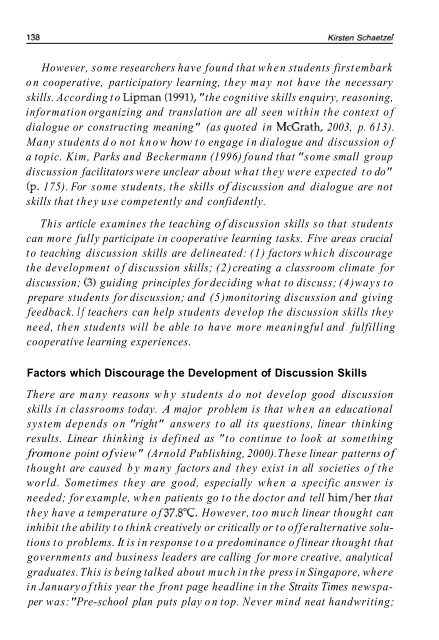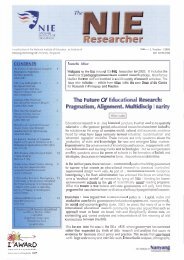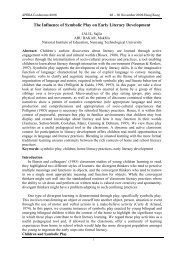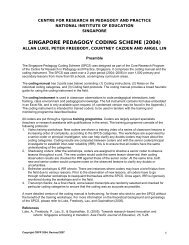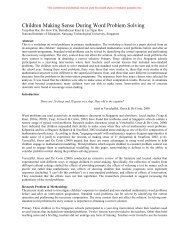Cooperative Learning - NIE Digital Repository - National Institute of ...
Cooperative Learning - NIE Digital Repository - National Institute of ...
Cooperative Learning - NIE Digital Repository - National Institute of ...
You also want an ePaper? Increase the reach of your titles
YUMPU automatically turns print PDFs into web optimized ePapers that Google loves.
However, some researchers have found that when students first embarkon cooperative, participatory learning, they may not have the necessaryskills. According to Lipman (1991), "the cognitive skills enquiry, reasoning,information organizing and translation are all seen within the context <strong>of</strong>dialogue or constructing meaning" (as quoted in McGrath, 2003, p. 613).Many students do not know how to engage in dialogue and discussion <strong>of</strong>a topic. Kim, Parks and Beckermann (1996) found that "some small groupdiscussion facilitators were unclear about what they were expected to do"(p. 175). For some students, the skills <strong>of</strong> discussion and dialogue are notskills that they use competently and confidently.This article examines the teaching <strong>of</strong> discussion skills so that studentscan more fully participate in cooperative learning tasks. Five areas crucialto teaching discussion skills are delineated: (1) factors which discouragethe development <strong>of</strong> discussion skills; (2) creating a classroom climate fordiscussion; (3) guiding principles for deciding what to discuss; (4) ways toprepare students for discussion; and (5) monitoring discussion and givingfeedback. If teachers can help students develop the discussion skills theyneed, then students will be able to have more meaningful and fulfillingcooperative learning experiences.Factors which Discourage the Development <strong>of</strong> Discussion SkillsThere are many reasons why students do not develop good discussionskills in classrooms today. A major problem is that when an educationalsystem depends on "right" answers to all its questions, linear thinkingresults. Linear thinking is defined as "to continue to look at somethingfrom one point <strong>of</strong> view" (Arnold Publishing, 2000). These linear patterns <strong>of</strong>thought are caused by many factors and they exist in all societies <strong>of</strong> theworld. Sometimes they are good, especially when a specific answer isneeded; for example, when patients go to the doctor and tell him/her thatthey have a temperature <strong>of</strong> 37.8"C. However, too much linear thought caninhibit the ability to think creatively or critically or to <strong>of</strong>fer alternative solutionsto problems. It is in response to a predominance <strong>of</strong> linear thought thatgovernments and business leaders are calling for more creative, analyticalgraduates. This is being talked about much in the press in Singapore, wherein January <strong>of</strong> this year the front page headline in the Straits Times newspaperwas: "Pre-school plan puts play on top. Never mind neat handwriting;


